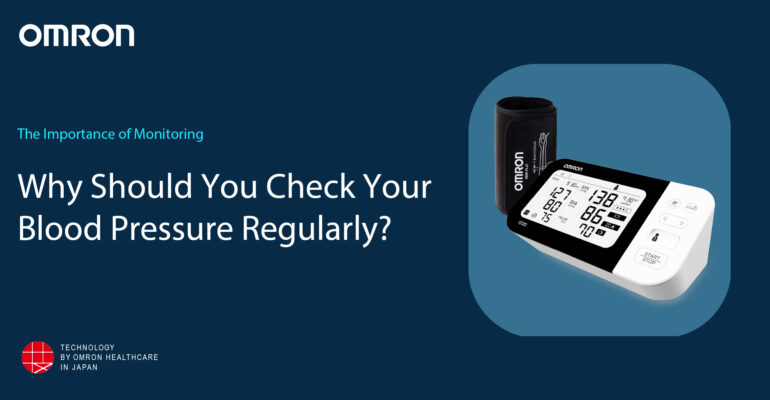Why Should You Check Your Blood Pressure Regularly?
March 10, 2023 2023-10-11 17:32Why Should You Check Your Blood Pressure Regularly?

Why Should You Check Your Blood Pressure Regularly?
Blood pressure is the force of blood pushing against the walls of your arteries. It is measured in two numbers: systolic blood pressure (the top number) and diastolic blood pressure (the bottom number). Systolic blood pressure measures the pressure when your heart beats, and diastolic blood pressure measures the pressure when your heart is at rest. Despite its relevance to general health, many people forget to check their blood pressure regularly. High blood pressure, commonly known as hypertension, can develop gradually over a period of time and have serious health effects if left untreated. Despite this, many people believe they are healthy and do not need to have their blood pressure checked.
Treating hypertension is necessary for preventing cardiovascular disease, stroke, and other consequences. Checking blood pressure at least once a year is recommended by the American Heart Association (AHA), although it may be necessary for some people to do so more frequently.[1]
It is crucial to monitor blood pressure regularly. Untreated hypertension is a leading cause of cardiovascular disease, stroke, and renal failure. Many of these issues, however, are avoidable with careful management.[2]
With a blood pressure monitor, you may rapidly check your blood pressure in the Pharmacy, doctor’s clinic, or even at home. Blood pressure is written as two numbers, with the first number representing the systolic pressure, which is the pressure created in the arteries during a heartbeat, and the second number representing the diastolic pressure, which is the pressure created in the artery when the heart is at rest.[3]
Blood pressure is the pressure of blood pushing against the walls of the arteries, and hypertension is diagnosed if the blood pressure reading is equal to or greater than 130/80 mm Hg. Hypertension, also known as high blood pressure, is a condition where the blood pressure is higher than normal, which can damage the heart and cause health problems if it stays high for a long time.[4]
Blood pressure can rise with age, and hypertension is common and untreated among the elderly. African Americans, people with a family history of the condition, those who are overweight, and those who have diabetes are more likely to have hypertension.
Monitoring blood pressure has more benefits than only treating hypertension. Checking your blood pressure with a BP Machine can teach you how to modify your lifestyle and habits to reduce your chance of getting cardiovascular disease and stroke. Cardiovascular diseases (CVDs) are a group of disorders of the heart and blood vessels, and they are the leading cause of death globally, taking an estimated 17.9 million lives each year.[5]
The Omron blood pressure monitor can help you track your blood pressure over time, so you can see how your health is changing. Using the Omron blood pressure monitor is simple and convenient. You can easily check your blood pressure from the comfort of your own home, at any time of day, and track your readings over time to spot any trends or changes. This device also comes with a range of features that make it easier to use.
One of the key features of the Omron blood pressure monitor is its IntelliSense technology. This technology ensures that the cuff inflates to the ideal level for everyone, providing accurate readings every time. This means that you can trust the readings you get from this device and use them to make informed decisions about your health and well-being.
Wrap-Up
Regular blood pressure tests make it simple to detect hypertension and begin treatment before it creates serious difficulties. Keeping your blood pressure in the standard range can reduce your risk of cardiovascular disease, stroke, and other serious health issues and boost your general health and well-being.
References:
- https://www.heart.org/en/health-topics/high-blood-pressure/understanding-blood-pressure-readings/monitoring-your-blood-pressure-at-home
- https://www.who.int/news-room/fact-sheets/detail/hypertension
- https://www.who.int/news-room/fact-sheets/detail/hypertension
- https://www.who.int/news-room/fact-sheets/detail/hypertension
- https://www.who.int/news-room/fact-sheets/detail/cardiovascular-diseases-(cvds)






